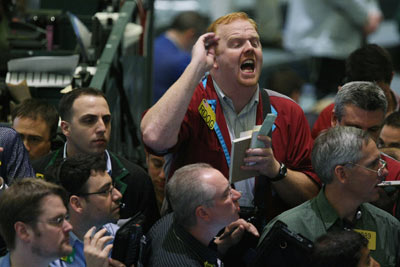May 10, 2004

By Christopher Doering
WASHINGTON (Reuters) - U.S. consumers will pay even more to fill up their automobiles as the average national price for a gallon of gasoline rose nearly 10 cents during the past week to a record high of $1.941 per gallon, the U.S. government said on Monday.
Pump prices are up 45 cents from one year ago, according to a weekly survey of more than 800 service stations by the Energy Information Administration.
Fuel prices have climbed in recent months because of strong demand for gasoline, tight petroleum supplies and high crude oil costs.
"It's not unexpected that we've seen prices increase this week," said Jonathan Cogan, a spokesman for the EIA. "And we don't expect this is the end."
When adjusted for inflation in 2004 dollars, the highest U.S. average retail gasoline price was $2.99 a gallon in March 1981, the EIA said.
On Monday, the Bush administration said it welcomed a proposal by Saudi Arabia for OPEC (news - web sites) to boost its crude oil production by about 6 percent, or 1.5 million barrels per day. Kuwait, another member of the Organization of Petroleum Exporting Countries, said it supported such a move.
"We welcome the actions of all producer nations to help both the U.S. and the global economy," said White House spokesman Trent Duffy, when asked to comment on the Saudi announcement.
The administration has expressed concern over the impact of high fuel prices in the United States, which consumes about 45 percent of the world's gasoline. President Bush (news - web sites) recently urged OPEC to boost production when it holds its next official meeting in June.
U.S. crude oil futures for June delivery tumbled by $1 to $38.93 per barrel on the Saudi announcement. Last week, U.S. crude oil briefly hit $40 a barrel for the first time since 1990 on concerns over security in the Middle East and tight U.S. gasoline supplies.
The EIA's weekly gasoline report showed the average U.S. pump price was the highest on the West Coast, where prices rose 11.7 cents to an average of $2.220 per gallon.
The U.S. Gulf Coast had the cheapest gasoline last week, rising 9.0 cents to $1.818 a gallon.
Among the 10 major urban areas highlighted by the EIA, Houston pump prices were the cheapest at $1.783 per gallon, up 9.7 cents. San Francisco was the most expensive city as prices rose 11.1 cents to $2.237 per gallon.
The national price for cleaner-burning reformulated gasoline, sold at about one-third of the gas stations in cities and smoggier areas, rose 10.4 cents to $2.017 a gallon.
U.S. diesel prices rose 2.8 cents to an average $1.745 per gallon last week, the EIA said. The average cost for a gallon of diesel is 30.1 cents per gallon more expensive than one year ago.


By Christopher Doering
WASHINGTON (Reuters) - U.S. consumers will pay even more to fill up their automobiles as the average national price for a gallon of gasoline rose nearly 10 cents during the past week to a record high of $1.941 per gallon, the U.S. government said on Monday.
Pump prices are up 45 cents from one year ago, according to a weekly survey of more than 800 service stations by the Energy Information Administration.
Fuel prices have climbed in recent months because of strong demand for gasoline, tight petroleum supplies and high crude oil costs.
"It's not unexpected that we've seen prices increase this week," said Jonathan Cogan, a spokesman for the EIA. "And we don't expect this is the end."
When adjusted for inflation in 2004 dollars, the highest U.S. average retail gasoline price was $2.99 a gallon in March 1981, the EIA said.
On Monday, the Bush administration said it welcomed a proposal by Saudi Arabia for OPEC (news - web sites) to boost its crude oil production by about 6 percent, or 1.5 million barrels per day. Kuwait, another member of the Organization of Petroleum Exporting Countries, said it supported such a move.
"We welcome the actions of all producer nations to help both the U.S. and the global economy," said White House spokesman Trent Duffy, when asked to comment on the Saudi announcement.
The administration has expressed concern over the impact of high fuel prices in the United States, which consumes about 45 percent of the world's gasoline. President Bush (news - web sites) recently urged OPEC to boost production when it holds its next official meeting in June.
U.S. crude oil futures for June delivery tumbled by $1 to $38.93 per barrel on the Saudi announcement. Last week, U.S. crude oil briefly hit $40 a barrel for the first time since 1990 on concerns over security in the Middle East and tight U.S. gasoline supplies.
The EIA's weekly gasoline report showed the average U.S. pump price was the highest on the West Coast, where prices rose 11.7 cents to an average of $2.220 per gallon.
The U.S. Gulf Coast had the cheapest gasoline last week, rising 9.0 cents to $1.818 a gallon.
Among the 10 major urban areas highlighted by the EIA, Houston pump prices were the cheapest at $1.783 per gallon, up 9.7 cents. San Francisco was the most expensive city as prices rose 11.1 cents to $2.237 per gallon.
The national price for cleaner-burning reformulated gasoline, sold at about one-third of the gas stations in cities and smoggier areas, rose 10.4 cents to $2.017 a gallon.
U.S. diesel prices rose 2.8 cents to an average $1.745 per gallon last week, the EIA said. The average cost for a gallon of diesel is 30.1 cents per gallon more expensive than one year ago.














Comment